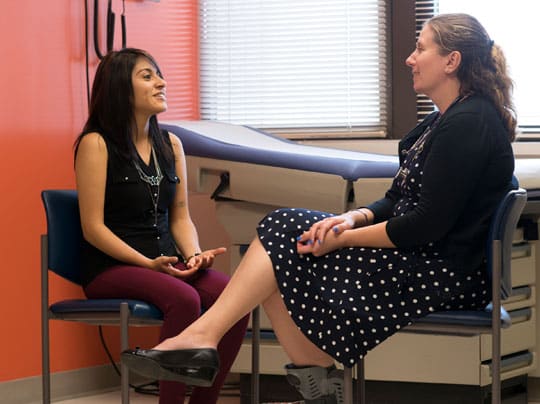
Social Media & Pediatric Mental Health
- December 17, 2025
- The REACH Institute
- Assessment & screening, Child mental health, High-risk children & youth, Parents, Patient communication, Pediatric primary care
Insights from Dr. Jasmine Reese ahead of an upcoming episode of REACHing Solutions, a new podcast series from The REACH Institute Social media is woven into nearly every part of young people’s lives. Recent data shows that about 93% of U.S. teens (ages 13–17) use at least one social media app. For many kids and…

Bullying and Pediatric Mental Health: What Primary Care Providers Should Know
- November 25, 2025
- The REACH Institute
- Assessment & screening, Child mental health, High-risk children & youth, Parents, Patient communication, Pediatric primary care
“Kids seldom come into your office and say, ‘I want to talk about bullying,’” explains REACH faculty member Ron Marino, DO/MPH. “Often, as clinicians, the only indication we have that a child is being bullied are changes in their behavior or new mental health symptoms. It’s our job to notice these changes and take appropriate…

PCPs Are on the Front Lines of Suicide Prevention: Tools to Feel More Confident Having the Hard Conversations
- September 12, 2025
- The REACH Institute
- Assessment & screening, Child mental health, High-risk children & youth, Pediatric primary care, Suicide
“The first time you ask a kid about suicide, it’s scary,” explains Eugene Hershorin, MD, a developmental pediatrician and REACH faculty member. “But navigating that fear and asking the question can save a child’s life.” Research shows that primary care providers have a critical role to play in suicide prevention. Among youth, 80% of those…

Managing Mental Health Disorders in Adolescent Cannabis Users
- August 21, 2025
- The REACH Institute
- Child mental health, High-risk children & youth, Pediatric primary care
“Mental health disorders and substance use are a very common comorbidity, including among youth cannabis users,” shares child and adolescent psychiatrist Blair Ritchie, MD FRCPC. With 40% of youth reporting prior cannabis use, pediatric primary care providers are increasingly likely to see patients in this population who also have mental health needs. Research on the…

Culturally Responsive Parent Empowerment and Children’s Mental Health
- July 23, 2025
- The REACH Institute
- Child mental health, Culturally responsive, High-risk children & youth, Parents, Pediatric primary care
“Parents want to feel like they’re part of the solution for their child’s mental health needs. As pediatric primary care providers, we can help make that possible by being thoughtful in how we navigate cultural differences,” explains Noor Jihan Abdul-Haqq, MD, a REACH faculty member and pediatrician with her own practice in Oklahoma City, OK.…

Mental Health Care for Under- or Uninsured Pediatric Patients
- June 26, 2025
- The REACH Institute
- Child mental health, Coding, High-risk children & youth, Pediatric primary care
“Evaluating and treating mental health problems in under- or uninsured pediatric patients often presents more challenges, but it is even more rewarding when you are able to provide life-changing mental health care,” explains Natalie Robiou, MD, a pediatric primary care provider at a Federally Qualified Health Center (FQHC) in Philadelphia, PA. The number of pediatric…

How Social Media is Impacting Teens
- May 10, 2025
- The REACH Institute
- Anxiety, Child mental health, Depression, High-risk children & youth, Parents, Patient communication
The most important question that we can ask teens isn’t if they use social media, it’s how. Just last May, the Surgeon General’s advisory on social media use in youth exposed some shocking statistics: Among 13 to 17-year-olds, up to 95% use social media, with 35% saying they use social media “almost constantly.”

Responding to the Alarming Rise of Depression in Adolescent Girls
- May 18, 2023
- The REACH Institute
- Anxiety, Assessment & screening, Child mental health, Depression, High-risk children & youth, Suicide
Gain a deeper understanding of the challenges faced by adolescent girls and the proactive steps clinicians can take to support them.

Supporting mental health needs in rural areas
- April 20, 2023
- The REACH Institute
- ADHD, Anxiety, Child mental health, Depression, Eating disorders, High-risk children & youth, LGBTQIA, Parents, Patient communication, Pediatric primary care
Rural healthcare providers can be overwhelmed—and understaffed with specialists. Discover how REACH inspired Elizabeth Wallis, M.D., to build a community to support her patients.

Dealing with mental health issues in injured student athletes
- March 14, 2023
- The REACH Institute
- Depression, High-risk children & youth
When student athletes can’t play, their mental health may suffer.

7 ways to support LGBTQIA+ youth
- June 23, 2021
- The REACH Institute
- High-risk children & youth LGBTQIA,
In a recent national survey, 46% of young LGBTQIA+ respondents said that they wanted counseling for psychological or emotional health issues and couldn’t get it. As a pediatric primary care provider (PCP), you may be well aware of the challenges your LBGTQIA+ patients face. To help you help them, we gathered suggestions from two experts, both of whom were panelists in our May webinar on supporting LGBTQIA+ youth: • Andersen Guske, nonbinary 22-year-old LGBTQIA+ advocate • Amy Dryer, MD, pediatrician and REACH faculty member Together, they offered 7 suggestions.

Promoting healthy grief
- September 16, 2020
- The REACH Institute
- Grief, High-risk children & youth Trauma,
COVID-19 has changed the way children experience the death of a loved one. Although difficult under any circumstance, bereavement is even harder when mourners can’t gather. Barriers to comforting mourning rituals and supportive social communities can make it harder for children to grieve in healthy ways, while increasing the risk for maladaptive grief reactions.

Mental health support for children in foster care
- July 11, 2018
- The REACH Institute
- Child mental health, Foster care, High-risk children & youth Medication,
“We have kids who come in here on three, four different medications,” says Dr. Elizabeth Wallis, MD, “and we don’t know why. We don’t know what data were used to make those decisions.” Dr. Wallis, director of the Foster Care Support Clinic (FCSC) of the Medical University of South Carolina and a REACH faculty member, was expressing just one of the challenges of treating children and youth in the foster care system.
Categories
- ADHD
- Anti-racism
- Anxiety
- Assessment & screening
- Autism
- Child mental health
- Coding
- Cognitive behavioral therapy
- College transition
- Culturally responsive
- Depression
- Eating disorders
- Foster care
- Grief
- High-risk children & youth
- LGBTQIA
- Medication
- Parents
- Patient communication
- Pediatric primary care
- School refusal
- Sleep disorders
- Suicide
- Trauma
- Show All Categories
Register for courses
“This course has made me more comfortable in dealing with my patients with mental illness As the PCP, I would normally refer to psychiatry or psychology, but I would now feel more capable to handle the more straightforward cases.”
